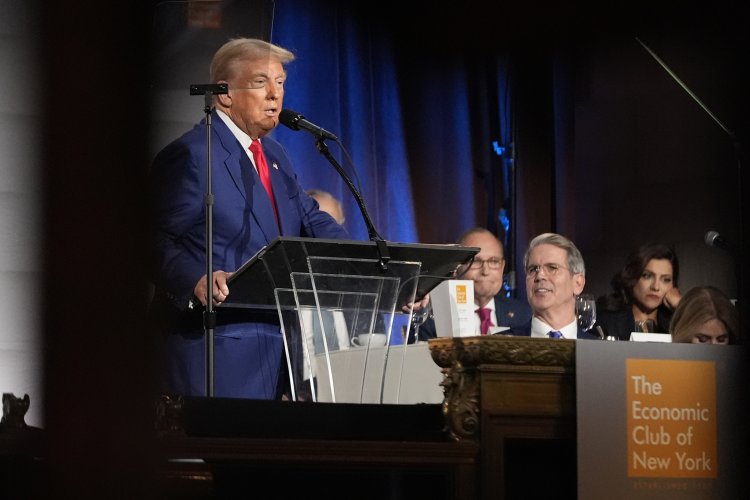Wall Street's Concerns May Start with Trump's Tariff Announcement
Recession risks are increasing as major banks revise their forecasts for economic growth downward and caution that inflation is set to rise.

“We’re still in the early innings of the story,” remarked Ron Temple, chief market strategist for Lazard’s financial advisory and asset management branch. “I don't believe most investors and, frankly, most Americans fully appreciate how these tariffs are going to translate to higher inflation, lower growth and lower corporate profits.”
The implications of this announcement are significant. The White House has positioned it as a pivotal moment intended to clarify how Trump’s tariff initiatives will boost domestic manufacturing and wages. However, if the president fails to present a compelling argument, it could further unsettle consumers and businesses, increasing the odds of an economic downturn and undermining his aspirations to rejuvenate Rust Belt communities and redefine global trade.
Concerns about a potential recession are rising. Major banks are revising their growth forecasts downward, cautioning that inflation may quicken as companies adjust to the ramifications of the tariffs, including the inevitable retaliatory measures from U.S. trading partners. Any reassurances from Trump are unlikely to quell ongoing concerns regarding the impact of future tariffs on critical economic sectors or how companies should navigate a global trade war.
“The headlines will probably be pretty clear. I’m not sure the details will be,” said Richard Bernstein, a former top investment strategist at Merrill Lynch who now leads his own $16 billion investment firm. “For CEOs, it’s the clarity and the details that matter.”
As the tariff announcement draws near, many administration officials remain uncertain about the extent of Trump’s plans. Press secretary Karoline Leavitt mentioned Monday that six key officials have submitted proposals to the president prior to the announcement—including Vice President JD Vance and Treasury Secretary Scott Bessent—but she emphasized that “it’s the president’s decision to make.”
Trump has not disclosed whether the new tariffs will be uniformly applied or vary by product. “You’re going to see in two days,” he stated to reporters in the Oval Office.
Tariff-related anxiety has significantly contributed to the decline of stock market indexes in the year’s first quarter, as well as diminished consumer confidence and overall economic sentiment. Goldman Sachs recently raised the likelihood of a future recession to 35 percent, citing disappointing surveys, a sluggish growth environment, and “statements from White House officials indicating greater willingness to tolerate near-term economic weakness in pursuit of their policies.”
Oren Cass, founder of the conservative think tank American Compass and a proponent of Trump’s trade policies, suggested that uncertainty surrounding the tariffs could “potentially impose economic costs far beyond the actual costs of tariffs.” He stressed the necessity for the administration to outline its plans and ensure they remain consistent over time.
“If you want auto companies to build more domestic plants, if you want steel companies to expand domestic production, they need to have some understanding of what the long-term outlook is for tariff policy,” Cass explained. “Otherwise, you get the costs and disruption with tariffs, without the upside of the investment.”
Within the West Wing, aides are closely monitoring the nervous financial markets, which have experienced a prolonged downturn since news emerged that Trump intended to proceed with widespread tariffs. This market reaction hasn’t prompted a significant reassessment of White House strategy, as Trump continues to advocate for substantial tariffs.
“We’re not ignorant of it,” commented a White House official, speaking anonymously about the potential repercussions of the new tariffs. “But there’s other factors at play here guiding the president’s decision-making on trade and tariffs in general.”
Senior White House aides have acknowledged the possibility of immediate financial repercussions from the tariffs but have largely dismissed it as an acceptable cost of pursuing policies they claim will yield future benefits. Currently, there are no plans for major exceptions or exemptions concerning the tariffs set to take effect later this week.
Trump has engaged in regular discussions with CEOs and industry experts over the past few days, but it appears unlikely that any specific industry will escape the impending tariffs. Some officials have minimized the stock market’s decline as a necessary correction following years of rising valuations, while others maintain that the tariffs will drive a manufacturing boom that overshadows the additional costs for most Americans.
However, among Republicans outside the West Wing, there is mounting concern about the economic and political ramifications they fear Trump is barreling toward. “I don’t think anybody thinks it’s going to go well,” said Michael Strain, director of economic policy studies at the American Enterprise Institute. “I suspect that when consumer prices go up and when the unemployment rate goes up and when GDP growth and manufacturing jobs don’t come back, that that could come as a surprise [to Trump].”
Frederick R Cook for TROIB News
Find more stories on Business, Economy and Finance in TROIB business












